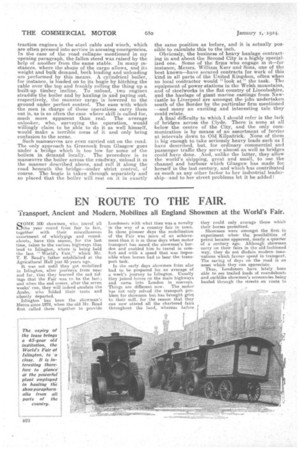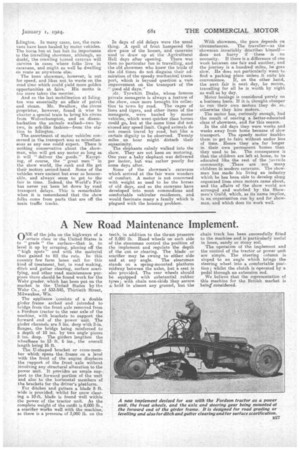EN ROUTE TO THE FAIR.
Page 10

Page 11

If you've noticed an error in this article please click here to report it so we can fix it.
Transport, Ancient and Modern, Mobilizes all England Showmen at the World's Fair.
SOME 500 showmen, who travel all the year round from fair to fair, together with their miscellaneous assortment of whirlygigs and roundabouts, have this season, for the last time, taken to the various highways that, lead to Islington, where is being held the last " World's Fair," which Mr. T. E. Read's father established at the Agricultural Hall just 45 years ago. It was not until they got mobilized in Islington, after journeys from near and far, that they learned the sad tid• ings that the Fair was to be the last ; and when the end comes, after the seven weeks' run, they will indeed emulate the Arabs, who folded their tents and silently departed.
Islington has been the showman's Mecca since 1878, when the old Mr. Read first called them together to provide
Londoners with what then was a novelty ' in the way of a country fair in town. In those pioneer days the mobilization of the Fair was more of an achievement than it is in these days when motor transport has eased the showman's burden and enabled him to travel in comfort and with a speed that was impassible when horses had to bear the transport task.
In the early days showmen from afar had to be prepared for an average of a week's journey to Islington. Usually they joined forces on the main highways and came into London in convoys. Things are different now. The motor has not only solved the transport problem for showmen but, has brought grist to their mill, for the reason that they can now attend all the chartered fairs throughout the land, whereas before they could only average those which their horses permitted. Showmen were amongst the first to experiment when the possibilities of petrol became apparent, nearly a quarter of a century ago. Although showmen carry on their fairs in the old-fashioned way, they do not disdain modern innovations which favour speed in transport. The saving of days on the road is an asset which they can appreciate.
Thus, Londoners have lately been able to see trailed loads of roundabouts and suchlike showmen's accessories being hauled through the streets en route to
Islington. In many cases, too, the caravans have been hauled by motor vehicles. The horse has at last lost its importance to the travelling showman, although, no doubt, the crawling horsed caravan will survive in cases where • folks live in caravans, and might as well be dwelling en routs as anywhere else.
The keen showman, however, is out for speed, and likes not to waste on the road time which could -yield more golden opportunities at fairs. His motto is the more taken the merrier.
And so the last mobilization at Islington was essentially an affair of petrol and steam. Mr. Swallow, the circus proprietor, however, found it wise to charter a special train to bring his circus from Wolverha•mpton, and on disembarkation the animals walked—two by two, in ark-like fashion—from the station to Islinnton;
The assortment of motor vehicles concerned in the transport was as miscellan. eons as any one could expect. There is nothing conservative about the showman, wlio. will gat any motor so long as it will " deliver the goods." Excepting, of course, the "great men " in the show world, the rank and file get their motors second-hand. Some of the vehicles were ancient but ever so honourable, and always seem to get to the fair in time. Indeed,' the World's Fair has never yet been let down by road transport delays. This is remarkable when it is remembered that the show folks come from parts that are off the main traffic tracks.
In days of old delays were the usual thing. A spell of frost hampered the slow pace of the horses, and caravans used to draw up at the Agricultural Hall days after opening. There was then no particular fun in travelling, and the old showmen who knew the trials of the old times do not disguise their admiration of the speedy mechanical trans. port, which is beyond question a. vast improvement on the transport of the " good old days."' Tyrwhit•t Drake, whose famous private menagerie is always a feature of the show, once more brought his collection to town, by road. The cages of lions and tigers, and other items of the menagerie, were hauled by motor vehicles, which went quicker than horses could go, but at the same time did not exceed any speed limit. Caged animals do not resent travel by road, but like a certain dignity to he observed. Twenty miles an hour might disturb their equanimity.
The elephants calmly walked into the show. They are not. keen on motoring. One year a baby elephant was delivered per motor, but was rather poorly for some days after.
Some of the showmen's caravans which arrived at the fair were wonders of comfort. A motor is not concerned with weight as used to be the horses of old days, and so the caravans have developed into most commodious and comfortable vehicular residences, and would fascinate many a family which is plagued with the housing problem. With showmen, the pace depends on
circumstances. The traveller—as the showman invariably 'describeshimself— does not hurry if there is no necessity. If there is a difference of one week between one fair and another, and the journey is a hundred miles, he goes slow. He does not particularly want to find a parking place unless it suits his
convenience. If, on the other hand, the next lair is next day, he moves, travelling for all he is worth by night as well as by day. Motor haulage is considered purely on a business basis. If it is thought cheaper to run their own motors they do so, otherwise they hire motors. • The motor has, curiously enough, had the result of rearing a better-educated class of showmen, and for this reason.
In the old days they were weeks and weeks away from home because of slow transport. The speedy motor 6nables them to get to fairs without undue loss of time. Hence they are far longer in their own permanent homes than they used to be. The consequence is that the children are left at home, to no educated like the rest of the juvenile community. There are not many children in modern caravans. The showman has made his living an industry which he has been able to develop along organized lines since motors came about, and the affairs of the show world are arranged and watched by the Showmen's Guild, which, as its name implies, is an organization run by and for showmen, and which does its work well.




























